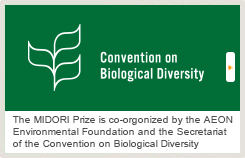The Japan Awards for Biodiversity 2009
*8 Excellence Awards including the Grand Prix were selected for The Japan Awards for Biodiversity 2009.
- Grand Prix
Use Field:Conservation of Paddy Fields in a Ravine through Cooperation with Local Businesses
The Asaza Fund (NPO)/Shiragiku Shuzo Co., Ltd./Tanaka Shuzo Co., Ltd.
 In tackling the restoration of headwaters formed by paddy fields in ravines from the standpoint of agriculture, the initiative utilized the rice wine manufacturing technology of regional saké breweries, as well as human resource and economic support from a diverse array of industries. And through the creative approach of using brewer's rice produced in the restored ravine paddy fields as an ingredient for saké, the recipients made "sustainable use" a reality. In addition, the recipients were also highly evaluated for excelling in their contributions to the region, and for winning the support of citizens.
In tackling the restoration of headwaters formed by paddy fields in ravines from the standpoint of agriculture, the initiative utilized the rice wine manufacturing technology of regional saké breweries, as well as human resource and economic support from a diverse array of industries. And through the creative approach of using brewer's rice produced in the restored ravine paddy fields as an ingredient for saké, the recipients made "sustainable use" a reality. In addition, the recipients were also highly evaluated for excelling in their contributions to the region, and for winning the support of citizens.
Activity Report : Project involving a Japanese lake and a sustainable movement that started from the restoration of a native water plant - Asaza Fund
Conservation Field: Initiatives relating to Shiretoko's Biodiversity
The foundation has had a distinguished record in biodiversity conservation on the Shiretoko Peninsula, a World Heritage Site, through initiatives such as ecological surveys of wildlife (brown bears, Ezo Shika deer, marine mammals, white-tailed eagles, etc.) and support for local nature conservation administration. The long-term continuity of the foundation's activities, the contributions it has made to the region in partnership with regional governments, and the scientific spirit of innovation shown in its forward-thinking research activities were also highly rated.
Conservation Research: Activities to Conserve Biodiversity in Regions focused on "Agriculture"
Agriculture and Nature Research Institute (NPO)
* The Agriculture and Nature Research Institute was dissolved in April 2010 after operating for ten years.
In addition to its contributions to biodiversity conservation in agriculture, the Institute has, through agricultural production activities, researched and promoted new agricultural technologies over many years, leading to widespread diffusion of the notion of biodiversity in agriculture. The Institute was judged highly for the combination of consistence and novelty, the regional awareness of its focus on ecosystems centered on uniquely Japanese rice paddies, and the manner in which it has reached beyond research into agricultural technology to also consider issues such as farmers' views on nature; as well as for the creativity of each individual initiative, its socially contributive qualities and the comprehensiveness of its initiatives.
Use Research: Ecological Network Research and Practical Application
The recipient has assessed the status of local biodiversity from the standpoint of organisms such as the Japanese pygmy woodpecker and the Japanese honey bee and, as part of its corporate activities, provides services reflecting that assessment in land use and city planning development projects. The unprecedented novelty of a private-sector business incorporating biodiversity value into development planning through the use of the easy-to-understand indicator of biological species is recognized. In addition, the recipient has proactively engaged in communication concerning the project, and was thus also judged highly for the social ripple effects of its efforts.
-
Conservation Product: "White Stork-Friendly Farming Methods" & White Stork Co-existence Rice
-
White Stork Conservation Rice Production Group/Japan Agriculture Tajima/White Stork Wetlands Net (Nonprofit)/Toyooka City/Toyooka Agricultural Extension Center
The recipients received high marks for implementing farming methods conscious of the biodiversity that produces "white stork rice" in order to conserve the habitat of the Oriental white stork, a regional symbol, and also for managing rice paddies and rivers rich in biodiversity while at the same time delivering a product to the market that contributes to food safety. The initiative was evaluated highly for region-wide activities in which farmers and also citizens work toward the revival of a symbolic regional species, as well as for becoming a model case of harmonization between local biodiversity and the economy.
Use Product: 10 Procurement Guidelines including Biodiversity Conservation
While seeking to have suppliers adjust their wood procurement practices using objective procurement guidelines, the company's contribution to sustainable use from the perspective of avoiding/minimizing negative influences on biodiversity is notable. In addition to its long-term perspective, the company was highly judged for working in cooperation with non-government organizations to create its own corporate standards, for internationalism with an eye to Japan's influence on biodiversity overseas, and for its social consciousness in changing supplier behavior. Additionally, the company's "Gohon no ki (Five trees)" concept that proposes biodiversity-conscious gardening to customers, was also judged highly.
Conservation Communication: Regular Implementation of "Let's Think About Biodiversity" Campaign
-
The Chunichi Shinkin Bank
Rather than just make donations dependent on account balances, the institution used product sales to convey to customers the importance of the word "biodiversity" and its conservation, and contributed to the understanding of those concepts. The novelty of the initiative as the first of its kind by a financial institution in Japan, and its contributions to society through the regional awareness aroused by staging the effort in Nagoya, Aichi, the site of the Conference of the Parties to the Convention on Biological Diversity (COP 10), and the civic-mindedness shown in the promotion of understanding among ordinary citizens, were highly praised.
Use Communication: "You Can Protect Borneo!" Campaign
Through its products, the company has made a difference by conveying to consumers the benefits of and dangers facing "biodiversity," as well as the necessity of sustainable use. In addition, by introducing Borneo to consumers and the media, the company has engaged in ample communication efforts. The company's internationalism, which takes into account matters such as the sustainable use of the palm oil that supports Borneo's citizens' livelihoods, and procurement of such resources in import-dependent Japan, and Japan's relations with production areas, along with initiatives to convey the idea to ordinary citizens that familiar foods have an impact on global biodiversity, were highly praised.
Organization:
AEON Environmental Foundation
Ministry of the Environment, Japan










